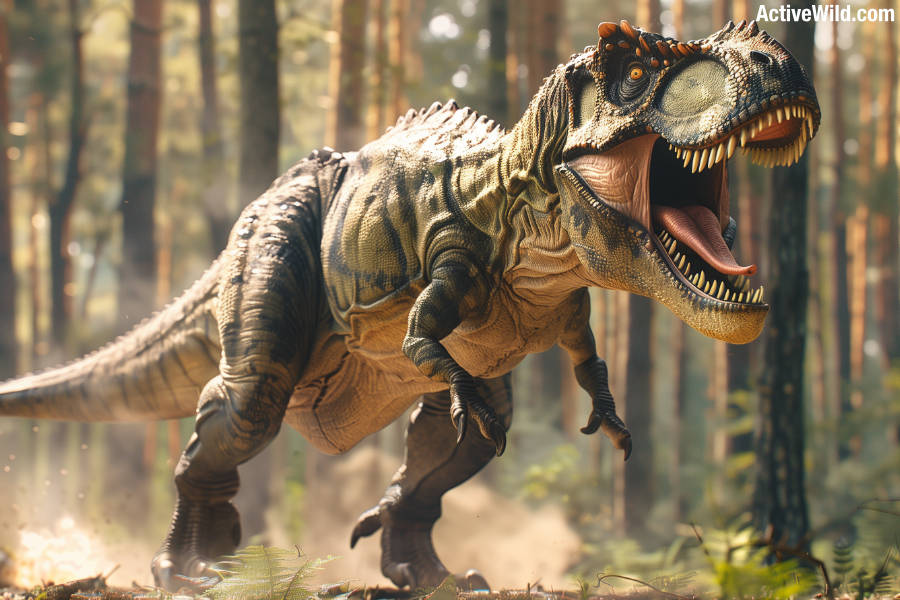Carcharodontosaurus, one of the most formidable predators of the mid-Cretaceous period, roamed North Africa approximately 100 to 93 million years ago.
This massive theropod, whose name means “shark-toothed lizard,” was named for its large, serrated teeth, which were similar to those of today’s great white shark.
Measuring up to 13 meters (43 feet) in length and weighing as much as 15,000 kilograms (33,000 pounds), Carcharodontosaurus was a dominant force in its ecosystem.
Discovered in the Sahara Desert in the 1920s, this dinosaur has since captured the fascination of paleontologists and dinosaur enthusiasts alike, providing critical insights into the diverse and dynamic world of prehistoric predators.
Visit our main dinosaur page for dinosaur facts, pictures, in-depth information and lists: Dinosaurs – The Complete Guide
Carcharodontosaurus Facts


- Type of Dinosaur: Theropod
- Diet: Carnivore
- Continent(s) Found: Africa
- Length: Approximately 12 to 13 meters (39 to 43 feet)
- Height (at the hips): About 3.5 to 4 meters (11.5 to 13 feet)
- Weight: Estimates range between 6,000 to 7,000 kilograms (6 to 7 metric tons or around 13,000 to 15,500 pounds)
- Period: Mid-Cretaceous (approximately 100 to 93 million years ago)
What Did Carcharodontosaurus Look Like?


Carcharodontosaurus was one of the largest predatory dinosaurs that ever lived. It roamed Earth during the mid-Cretaceous period, approximately 100 to 93 million years ago.
The appearance of Carcharodontosaurus was typical of large theropods, with a large head and relatively short arms. The tail was long and likely used for balance.
Carcharodontosaurus had a large, elongated skull with a length of up to 1.6 meters (5.2 feet). Its teeth were large and serrated, similar to those of a shark, hence the name “Carcharodontosaurus,” which means “shark-toothed lizard.” (Carcharodon is the genus to which the great white shark belongs.)


The teeth of Carcharodontosaurus were up to 20 centimeters (8 inches) long, and adapted for slicing through flesh.
Like many theropods, Carcharodontosaurus had relatively short but robust arms, each ending in three sharp claws. It had powerful hind legs that supported its considerable weight, ending in large, clawed feet.
Carcharodontosaurus Size
Carcharodontosaurus was massive and muscular, built for power rather than speed. Its size and weight estimates are based on fossil evidence and comparisons with other large theropods. It measured approximately 12 to 13 meters (39 to 43 feet) in length. Standing height at the hips was about 3.5 to 4 meters (11.5 to 13 feet).
Estimates suggest Carcharodontosaurus weighed between 6 to 7 metric tons, or around 13,000 to 15,500 pounds.
Overall, Carcharodontosaurus was a massive, fearsome predator with a robust build, well-adapted for hunting large prey. Its formidable teeth and powerful jaws would have made it one of the top predators of its time. Its overall build, including its muscular body, powerful limbs, and long tail, suggests it was well-suited for a life of active predation in the Cretaceous ecosystems.
Carcharodontosaurus Vs T. Rex


Carcharodontosaurus, native to mid-Cretaceous North Africa, reached lengths of up to 13 meters (43 feet) and weighed between 6 to 7 metric tons (13,000 to 15,500 pounds).
In contrast, T. rex, which lived in North America during the Late Cretaceous, was slightly shorter but more robust, measuring up to 12.3 meters (40 feet) in length and weighing around 9 metric tons (20,000 pounds).
Carcharodontosaurus had a long, narrow skull adorned with serrated teeth resembling those of a shark, optimized for slicing flesh. T. rex boasted a massive, powerful skull with thick, conical teeth capable of crushing bone, reflecting its role as an apex predator with a diverse diet, including large herbivores and possibly scavenging.
Both dinosaurs had relatively short forelimbs compared to their body size, but T. rex’s arms were particularly small and robust, each ending in two functional claws. Carcharodontosaurus had somewhat longer and more functional forelimbs with three claws, suggesting a different predatory strategy.
What Type Of Dinosaur Was Carcharodontosaurus?


Carcharodontosaurus was a Theropod.
Theropods were a group of bipedal dinosaurs that included some of the most fearsome predators of the Mesozoic era, including Tyrannosaurus, Spinosaurus, and Allosaurus.
Where Did Carcharodontosaurus Live?
Carcharodontosaurus lived in what is now North Africa. The first Carcharodontosaurus specimens to be discovered came from the Bahariya Formation in Egypt. Other fossils have been found in Algeria, and in the Lower Douira Formation, Kem Kem Beds in southeastern Morocco.
When Did Carcharodontosaurus Live?
Carcharodontosaurus lived during the mid-Cretaceous period, around 100 to 93 million years ago.
You can find out more about the Cretaceous Period on this page: Cretaceous Period Facts
What Dinosaurs Did Carcharodontosaurus Live With?
Dinosaurs that lived alongside Carcharodontosaurus include:
Paralititan: One of the largest known sauropods, this massive herbivore would have been a significant part of the ecosystem, providing a potential prey source for large predators.
Dicraeosaurus: a relatively small sauropod dinosaur from the Late Jurassic period, characterized by its shorter neck and distinctive bifurcated (split) neural spines, which gave it a unique appearance among sauropods.
Spinosaurus: Another large predatory theropod, Spinosaurus was semi-aquatic and likely competed with Carcharodontosaurus for food resources.
Discover More About Dinosaurs With Active Wild
Visit our main dinosaur page for dinosaur facts, pictures, in-depth information and lists: Dinosaurs – The Complete Guide
You can see more Cretaceous Period dinosaurs on this page: Cretaceous Period Dinosaurs

